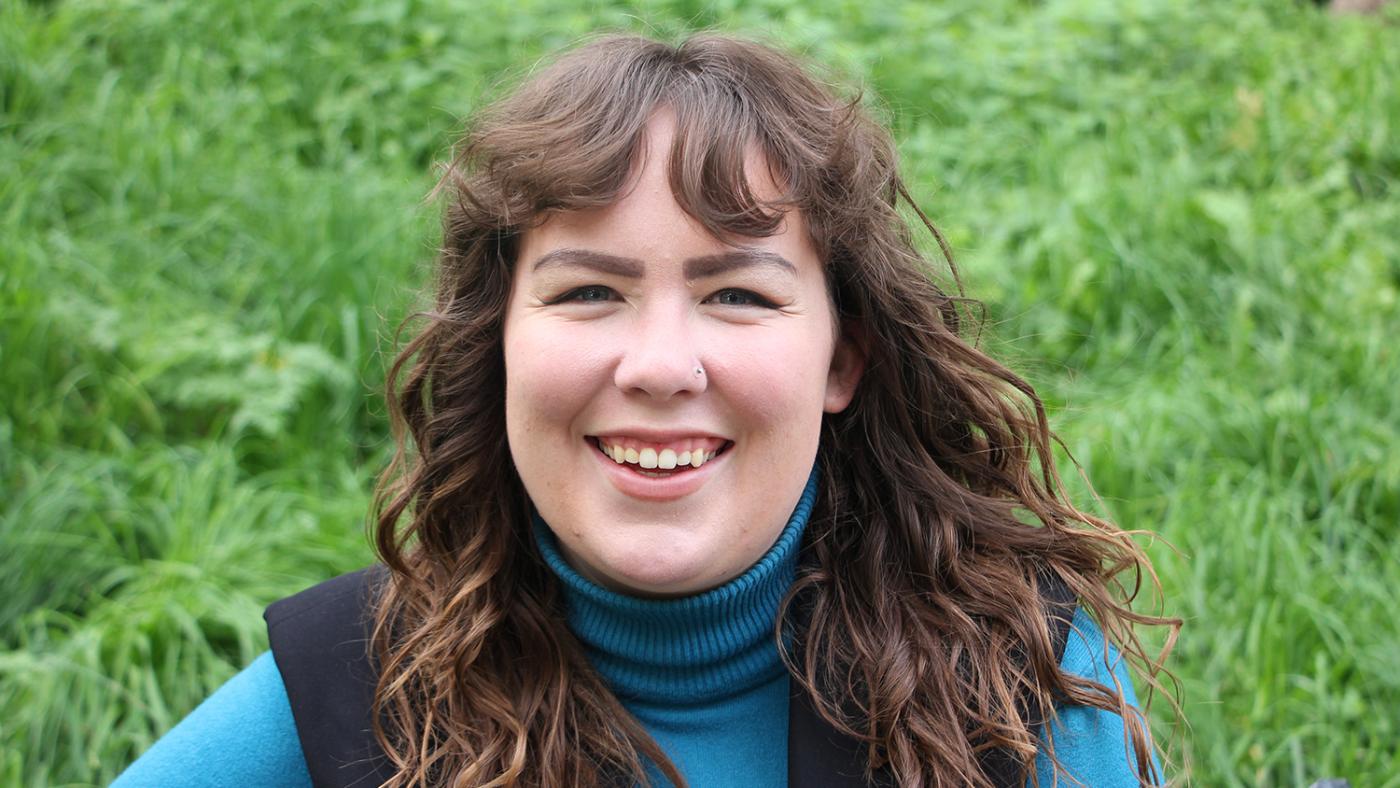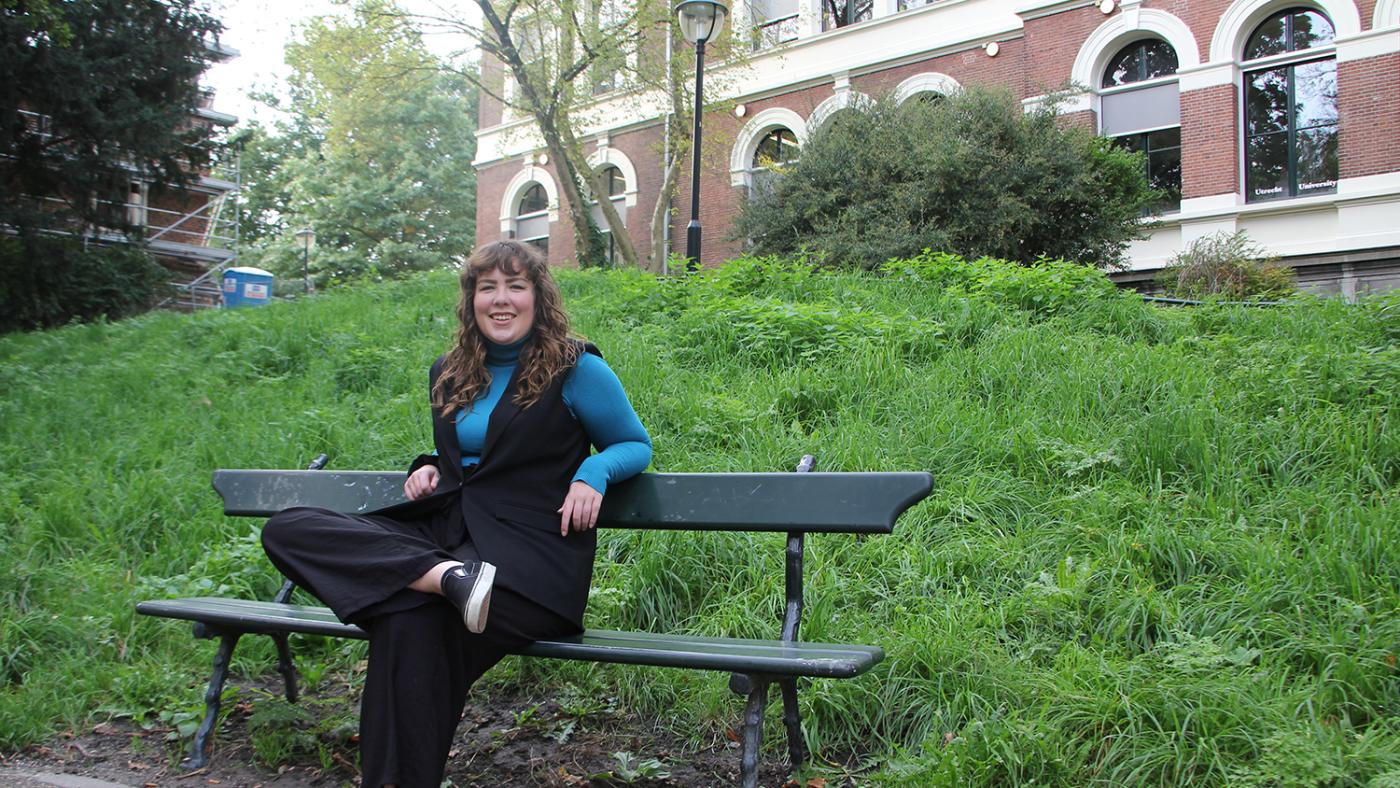Tara Tankink gives six pieces of advice in Master’s thesis
‘Students with invisible disabilities often run into barriers at university’

According to Tara Tankin, the term "students with invisible disabilities" is reminiscent of diagnoses like ADHD, autism, and dyslexia, but it also includes people who might not have been diagnosed but who run into issues in their studies because of depression, trauma, unsafe home situations, or caring for someone else. “I don’t like the word disability,” she says, “but it does make a lot of things clear. The university system was once designed for people who were mentally and physically in control. In those days, people with disabilities were not allowed to study at university. You can still see that, as they encounter all sorts of barriers in their studies because the system does not take them into consideration.”
In June, Tara graduated with a Research Master's in Public Administration & Organisational Science. Her thesis is titled Ableism at University: Experiencing Student Life with an invisible disability. She could have graduated earlier but long-dormant and ignored issues developed into depression and burnout when she was about to start writing her thesis, forcing her to take a break. Her supervisor supported her completely and, when she felt better, they came up with the idea of focusing her research on people like herself, who don’t fit into the picture of the student who is fully healthy physically and mentally. How do these students get by at university? What kinds of issues do they run into? And, more importantly, how do they feel at Utrecht University specifically?
Not taken seriously
After finding a group of students with invisible disabilities, she started her research, and was surprised at every turn. The experiences they shared made her angry and sad. “Many students are often not taken seriously when they ask for help. One participant, for instance, had to travel to Norway to recover from an illness but they were not allowed to participate in a course remotely. Another student had both cancer and PTSD (Post Traumatic Stress Disorder, ed.). When she had to go to the hospital to treat the cancer, there were plenty of things that could be arranged. But, when she asked for help due to PTSD, she had to figure things out herself.”
Programmes with a lot of students tend to be the ones creating the most barriers for students, according to Tara. “They’re so impersonal. The students feel like numbers.” Her own experiences are starkly different. “I studied at Bijlhouwerstraat, where basically everyone knows each other, both students and lecturers. I didn’t think that would be any different in other programmes, so that was a shock to me. The impersonal aspect of these programmes is one of the reasons why students with invisible disabilities don’t dare to ask for help, don’t get any help, or don’t receive the right kind of help.”

Tara in front of the building from the Faculty of Governance, on Bijlhouwerstraat. Photo: DUB
Stigma and disbelief
The conclusion of her thesis speaks for itself. It has five overarching themes. First of all, the students feel invisible at UU. It costs them more effort to attend classes and keep up with their studies, and on top of that, they also have to spend energy fighting to get help or what they’re owed. People often do not believe that they need help in the first place. One student says: “If someone in a wheelchair asks you where the lift is, would you ask them whether or not they could walk up the stairs? Well, that’s exactly what students with invisible disabilities face when they ask for help. People often ask them if they really can't do without the help they are asking for,” Tara says.
The second theme is the fact that these students have to combat a stigma of being dumb, lazy and incapable, something they’ve been hearing their entire lives at school, and then, once they get to university, they have to deal with that as well. They must constantly convince themselves that they are not any of these things.
Thirdly, there is the realisation that the university is not designed for students with disabilities, let alone invisible ones. Disabilities are usually seen as the student’s problem. All rules, schedules, exams and assignments were made for people without disabilities. One of the participants says: “The university wants me to fit into this mould that simply won’t fit me. I don’t learn the way the university says that everyone should learn.”
The students Tara interviewed also complained about UU’s individualistic approach. They are supposed to take care of themselves as there is no one who will look out for their wellbeing. According to Tara, there is a perceived optimism about UU becoming increasingly inclusive because of lecturers, students and supervisors who do see and help disabled students. But she observes that these great examples are the exception to the rule and a lot still has to happen for UU to be able to call itself truly inclusive.
Emotional
Conducting this research was an emotional and intense process, says Tara, as she couldn't be as distant and objective as she usually is. “I looked at the university system through a critical, feminist gaze, which means that I also looked at how the current university system was created and what the current consequences are.”
The way she collected data wasn’t typical either. Apart from the theoretical research and the in-depth interviews with ten students, she asked participants to keep a journal, documenting each time they faced barriers at the university and how that made them feel. They could do that in prose but also with poems, drawings, or any other kind of visualisation. According to Tara, the participants dared to be vulnerable because of this. Another thing that helped was that she was very open about her own invisible disability, which generated a sense of trust between them.
The way she wrote the thesis was remarkable too. Tara analysed the information she obtained using poetry. Here are the first lines of a poem she wrote about her experience as a researcher, loosely translated.
Am I a subjective researcher or am I a research subject?
Can my experience help me ask better questions, or am I too direct?
Am I empathising with you or does your experience touch upon one of mine?
I’m not a psychologist, I’m not your friend, but I’m there
And another one, about the stigma participants face:
I am lazy, that’s what they say
I can’t contradict it, it sounds about right
It does indeed take quite some effort to get out of bed
And once I’m up, it’s not as though I do a lot of work
Three pieces of advice for lecturers
One would be mistaken to think that all the students did was complain about the university. They also shared a few pieces of advice on how to improve the university for all students. To obtain this advice, Tara divided the participants into three focus groups tasked with finding improvement points.
Six pieces of advice came up in total, three of which are directed at lecturers, who could be more accessible by telling students at the start of the course that they can turn to them to ask any sort of questions. Lecturers were also recommended to take students seriously and assume that they are doing their best, realising that it's not a matter of willpower when something doesn’t go well.
The second piece of advice is to standardise all preparation for classes. This includes improving PowerPoint presentations, time planning, and uploading course manuals, for example.
The third recommendation concerns the accessibility of classes. Make sure that classes are always recorded, so they can be watched later by those who need repetition to learn. Lecturers should be flexible when students ask for online classes or when they state they cannot be present in person.
Three pieces of advice for the Executive Board
The students also gave three pieces of advice for the Executive Board. Improving facilities, such as providing soundproof exam rooms and more quiet rooms for studying, would be an important step. But they also want UU to improve the way it communicates about what the university offers for students who need extra help.
Scheduling is one of the things that could change. Participants request two weeks of break after each term. “Currently, there is a very long break during the summer but barely any breaks throughout the year, and students with invisible disabilities have to take a lot of resits. With longer periods of rest, we'd have more opportunities to rest, take our resits, and prepare for the next term.”
Perhaps the most important piece of advice is to make the university more personal so that students stop feeling like they’re nothing but numbers. This could be achieved by strengthening their connection with lecturers, who should have enough contact hours to get to know the students. They also request a tutor for the duration of their studies.
“The no-strings-attached nature of the current tutoring system has to go,” Tara says. “You can go to a tutor, but the student has to make an appointment themselves, which is a barrier to some. If the tutor and the student have to see each other regularly, they will have a bond with each other. This way, the tutor would also notice when the student is not doing well and, hopefully, the student will feel safe enough to address their issues with the tutor. This would make the university more personal and ensure that students feel seen.”
A poem written by Tara for her thesis, based on the conversations she had with the students who participated in her research (loosely translated without rhyme):
I would love to be like you
You have motivation, structure, you can plan, you belong
You’re what they want, the photo on the site
You’re the model student, the foundation of the policies
Your brain works as it should
Without odd side paths, distractions, without endless struggles
Your tongue forms the words that it’s meant to form
Without stuttering, distractions, or delays
You’re understood by everyone
They’ll never mark you absent
You don’t need adjustments, you never fall
You’ve already done next week’s tasks
And I, I am just hanging in there
They don’t trust me, there’s a great difference between you and me
When you ask them something, they’re ready to go
And I fall behind in a storm of question marks: ‘They’ll be right there with you’
15 percent
In October, the Expert Centre on Inclusive Education (ECIO) published its annual student satisfaction report about what it is like to study with additional needs such as mental health issues, caregiver duties, or physical limitations. More than 15 percent of students in higher education indicate that they have additional needs, nearly half of whom (45 percent) state they experience some or a lot of barriers in their education. Students with mental health issues and ADHD are the most likely to experience a lot of barriers as they are the least familiar with the help offered by their educational institutions, and the least satisfied with it. This concerns, for example, the level of understanding of their needs.